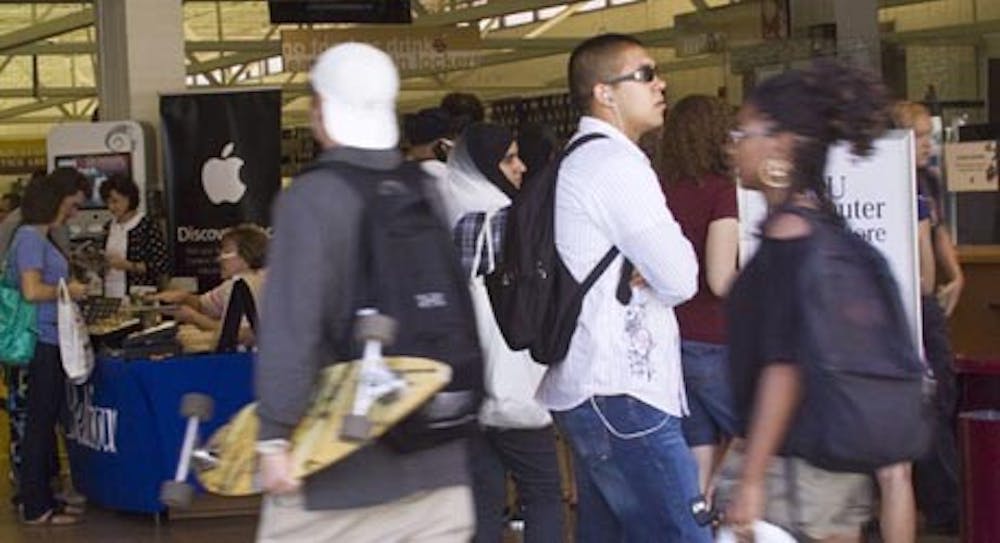The fight against growing textbook prices continues this week as students across the country prepare for a nationwide event Thursday.
The Day of Action is an effort to promote cheaper textbooks among universities, said Nicole Allen, director of the Public Interest Research Group’s Make Textbooks Affordable campaign.
The Arizona Students’ Association is the main force behind promoting cheaper textbooks at ASU on the Day of Action, she said.
The Day of Action at ASU will consist of a group of students meeting with and discussing alternative textbook sources, such as open-source textbooks, said psychology sophomore Abby Henderson, ASA director on the Tempe campus.
Open-source textbooks are a cheap alternative to typical textbooks and are available free online or at a cheaper printing cost. The printing cost usually ranges from $20 to $40, Allen said.
Students plan to speak to professors on the Tempe campus about adopting alternative textbooks, such as open-source textbooks. Other volunteers may be speaking with professors on the other campuses as well, she said.
“Basically the message we want to get out, is we want to make sure professors know that there are options for textbooks other than what are sold typically,” Henderson said.
This alternative will benefit students who have trouble paying for textbooks and are just as high quality as other textbooks, Henderson said.
“Open-source textbooks are just like regular textbooks,” she said. “They’re just as reliable and they’re just as credible.”
These books are still written by professors and other professionals that typically write textbooks, however, they are not writing them with the intention of making a profit. They understand students cannot always afford textbooks, so they do it as an attempt to help students out, Henderson said.
ASU Bookstores associate director Dennis Mekelburg said he thinks open-source textbooks will be cheaper, but may not be as reliable.
“The upside would be they could be inexpensive or free,” he said. “But the downside is open source is typically not vetted as well as a typical textbook.”
Students may not be able to know if the textbook has been examined properly for grammatical errors and accuracy and the book would have to be looked at very closely before making the decision to use the book, he said.
Whether professors decide to use open-source textbooks or not, it’s vital that textbooks become cheaper somehow, Henderson said.
“I have a couple of friends who have decided to not buy textbooks for their classes and are harmed academically,” she said. “I think if you can’t buy the textbooks and you’re suffering academically, then there’s something wrong with the system.”
The bookstore is continuing to make an effort to keep the price of textbooks down, Mekelburg said.
Sun Devil Digital, ASU’s in-store textbook printer designed to be a cheaper alternative, now has about eight to 10 textbook titles available, he said.
Faculty, students and the general public can also use the printer for personal books as well. There are an additional 20 titles or so that have been printed for this cause. People can print anything as long as they have the copyright cleared, he said.
Some of the textbooks available include marketing, geology and accounting textbooks. The number of textbooks printed varies with each book. One professor made 300 copies. Others range anywhere from 15 copies to 300. It takes between five and six minutes for each textbook to be printed, he said.
“We’re only about 90 days into this thing, so we’re just barely scratching the surface,” Mekelburg said.
The service plans on adding more available textbook titles for the spring semester. Professors are currently in the course adoption season, where they decide what books will be used in the next semester. The bookstore will begin receiving orders in November or December, he said.
To provide more affordable options, the bookstore also expanded the renting options and the website provides a tool that compares its textbook prices with other leading online textbook stores. There are also links to free online e-books if they’re available, he said.
“We’ve been working hard to provide as many options as possible,” he said.
Reach the reporter at cottens@asu.edu
Want to get the latest ASU news in your inbox every day? Sign up for our new e-mail newsletter.





